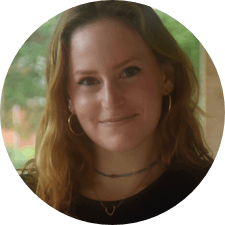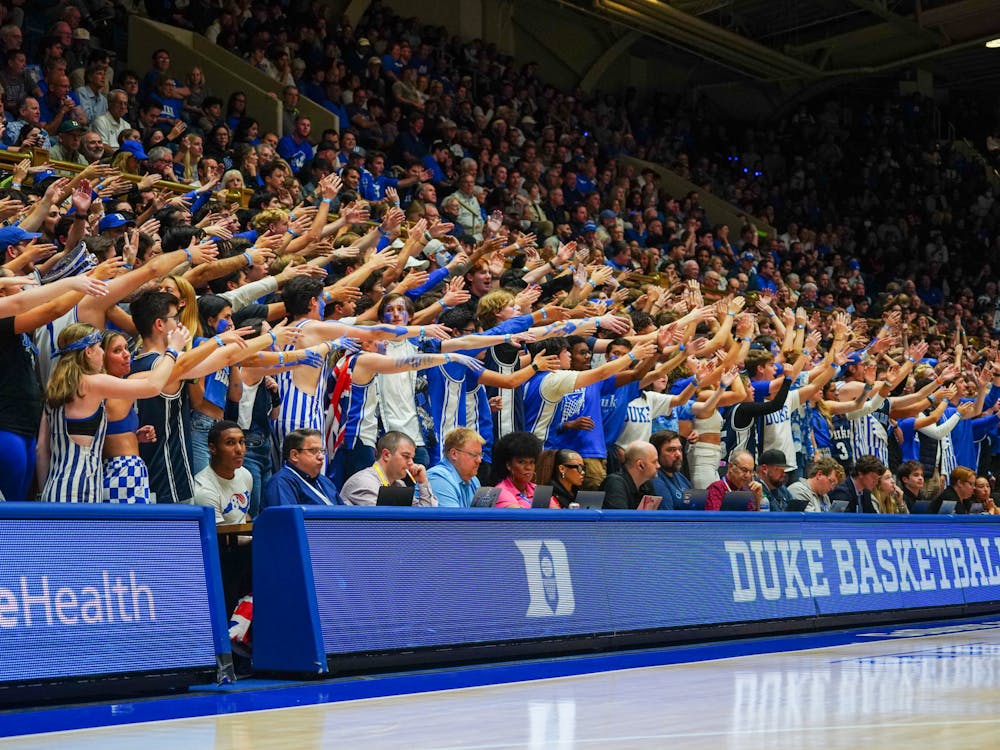When Millie Caughey was accepted into Duke as a Robertson Scholar, her friend asked her for her thoughts on Zion ... Williamson, that is. She thought they were asking about the National Park.
“The whole room went silent, and they all started laughing at me,” she told The Chronicle. Caughey and her family live in Auckland, New Zealand. College basketball doesn’t have as much reach on the other side of the world.
Caughey wasn’t, however, just going to be a Blue Devil. By the nature of the Robertson Scholarship Program, a fully-funded scholarship connecting Duke and the University of North Carolina at Chapel Hill, her identity was always bound to be at least a little split. The program aims to connect and foster collaboration between the two campuses. Robertson Scholars, whether accepted as high school seniors or college freshmen, each have a home institution, but spend the spring semester of their sophomore year at the other campus eight miles down the road.
When Caughey arrived in Durham in August of her freshman year, she had very little sense of the depth of the rivalry. She knew the other Robertsons, many of whom were in Chapel Hill. However, as she grew her Duke circle, those hours spent on Franklin Street turned into hours in Krzyzewskiville.
Her freshman year was Mike Krzyzewski’s last season as Duke’s head men’s basketball coach and the first year with fans allowed back in Cameron Indoor Stadium after the pandemic. Demand for games — including Countdown to Craziness — was unprecedented.
“We stayed up all night to get tickets. And we ended up being turned away,” Caughey said about her first K-Ville experience. The scrimmage was set to be on her birthday, and the night before, one of her friends surprised her with a ticket as a gift.
“I joined a group of people that I barely knew, and I went and it was just the most insane birthday ever,” Caughey said. “I don’t know how to describe it.”
“There I was, cheering my face off, covered in blue paint. And I thought, ‘oh f—, I’m one of these now.”
* * *
After three semesters fully immersed in their home institution’s classes, culture and extracurriculars, Robertson Scholars must pack up their collegiate lives and move down the road into enemy territory.
“People approach [the] Robertson switch from the outside very differently,” Caughey said.
Her approach? Spending the first few weeks of her switch semester commuting back and forth to Durham as she black tented for the Duke-North Carolina basketball game. Black tenting is the most extreme level of Duke’s strange student ticketing tradition, requiring the most tent members in K-Ville for the longest period of time. As a result, Caughey spent her time either in class, on the Robertson Express or in her tent.
“I don’t think I had the social experience at UNC that I probably would have liked,” Caughey said. “But at the same time, I think it was good in that tenting allowed me to keep connections with people at Duke a lot more alive.”
She has no regrets.
Zack Finacchio had a similar switch experience. The current junior lived in Chapel Hill last spring, but spent most of his weekends back in Durham with his Duke circle. He still got involved in North Carolina’s campus life, mostly by joining the school’s improv group, the Chapel Hill Players. He even organized a Tobacco Road improv show that included his new group at North Carolina, his old group (Duke University Improv) and N.C. State’s CIA Improv.
But his experience in class was a bit different.
“I tended to keep my head down when it came to discussions about Duke or UNC students,” Finacchio said. He only wore Duke merch once, to his last final before he joined his friends in Myrtle Beach, S.C. — an annual post-semester getaway for many students — for his theater studies class.
“Everyone in my class knows that I’m a Robertson, they’ll all get over it,” he justified.
“I did my whole big, emotional presentation, and it was this big, upheaval of a scene, and then I finished, and the class was supposed to give me feedback,” he added. “And the first thing that somebody said was, ‘Why the hell are you wearing Duke gear?’”
Duke-based sophomore Caleb Dalgetty just started his switch semester.
Get The Chronicle straight to your inbox
Sign up for our weekly newsletter. Cancel at any time.
“On my first day, I will admit I went to the bookstore, and I bought a Carolina jersey, so I could blend in when necessary,” he said. He came back to Durham for the men’s basketball game against Georgia Tech in January.
“I feel a little bit like I’m betraying my new place, my new home now, when I do that,” Dalgetty said. “I’m kind of like a double agent, like an operative in my own home.”
Duke-based sophomore Adom Appiah was raised a die-hard Blue Devil basketball fan, and even living amongst the opposition won’t change that.
“I’d grown up detesting [North Carolina],” he said. When he was younger, he would attend the Duke basketball camps — except for one year, when delayed signups meant he was spending his week in Chapel Hill at the Roy Williams North Carolina basketball camp.
“I didn’t smile the entire week,” he said.
Appiah approached the Robertson switch differently than that basketball camp, this time with curiosity and an open mind. That doesn’t apply to his allegiance.
“I’ve got Duke jerseys and Duke merch galore, and I fully intend to wear it,” Appiah said. He hasn’t yet — he would like to “preserve [his] life for the time being.”
“I really want to fully support Duke basketball,” he said, “and do so proudly on this campus of Duke basketball haters.”
* * *
April 2, 2022 is a day that was immediately written into the history books for both fanbases. That Final Four weekend just so happened to coincide with Robertson Connection weekend, when all accepted prospective Robertsons come to the Triangle to get a sense of the program and the two schools — like Blue Devil Days on steroids. For a program so focused on the connections and collaborations between Duke and North Carolina, the Final Four matchup was a perfect storm to test loyalties and create division.
“This will be unlike any experience that any Robertson has had before,” said the program’s executive director, Andrew Lakis. “And who knows if it’ll ever happen again.”
Naturally, they organized a watch party, taking over the Karsh Alumni Center to house both shades of blue. In addition to the prospective Robertsons and the current scholars, they invited program alumni back for the weekend.
“These are all people who share values and share purpose and are just amazing human beings and really close to one another,” Lakis said. “But as soon as the ball tipped off, you either had on your Duke stuff, or you had on your UNC stuff.”
“You had just spent 24 or 48 hours getting to know all these people. And suddenly, you’re all in this setting where the allegiance is split … Rooting for different teams somehow brought us closer together,” said Riya Sharma, a North Carolina-based sophomore currently in her switch semester at Duke. She was a prospective Robertson at the watch party.
“I think it’s the one sporting event I’ve witnessed where everybody was just as into it as the next person,” she said.
“[Everyone’s] trying to convince their ‘Robbies,’ their potential Robertsons, that this is the side, and this is where they get to be,” Finacchio said. “Everybody was able to have a celebration that night.”
The rivalry, for the Robertsons, is very real, but it stays where it is rooted: on the court. Instead, scholars can dive wholeheartedly into the opposite campus and its culture, while preserving the unifying effect of having an enemy to root against.
“You can’t have this kind of rivalry without a deep sense of mutual respect,” Sharma said.
The Robertsons know that all too well.
Editor’s note: This piece is one of many in The Chronicle’s 2023-24 Duke men’s basketball rivalry edition. To read more, click here.

Rachael Kaplan is a Trinity senior and a senior editor of The Chronicle's 120th volume.

